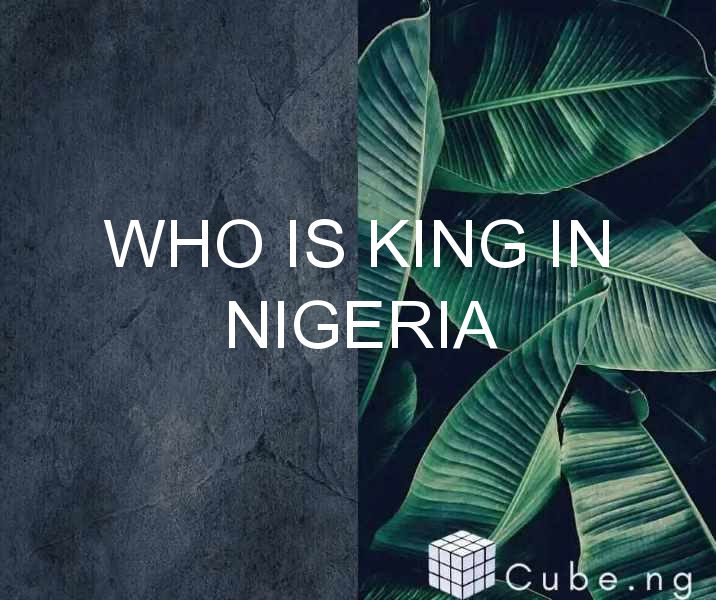Table of Contents
Who Is King In Nigeria: A Comprehensive Overview
As the most populous country in Africa, Nigeria is a nation with a rich cultural heritage and a fascinating history. One of the most intriguing aspects of Nigeria's history is the role of traditional rulers, or kings, in the country's governance and society. In this article, we will explore the position of kings in Nigeria, their history, and their influence in contemporary Nigerian society.
The History of Kings in Nigeria
The history of traditional rulers in Nigeria dates back to the pre-colonial era when different ethnic groups had their own forms of governance. These systems of governance were sometimes centralized, with a powerful king or ruler presiding over a kingdom, or decentralized, with several chiefs or elders sharing power. With the arrival of European powers, particularly the British Empire, the role of traditional rulers in Nigeria's governance began to change.
During the colonial period, the British authorities sought to centralize power in Nigeria and establish a centralized system of governance. They did this by appointing traditional rulers as indirect rulers, giving them authority over their own people but making them accountable to the colonial administration. This system of governance continued even after Nigeria gained independence in 1960, with traditional rulers serving as intermediaries between the government and their subjects.
The Role of Kings in Nigerian Society
Despite the changes wrought by colonialism and modernization, traditional rulers continue to play a significant role in Nigerian society. In many parts of the country, they are still regarded as custodians of tradition and culture, with important ceremonial and religious roles. They are often consulted on matters of community development and welfare, including issues such as land allocation, conflict resolution, and the promotion of local industries and businesses.
In addition to their traditional roles, many kings in Nigeria have become influential political figures in their own right. Some have been appointed to positions of political authority by the government, while others have used their influence and resources to support political candidates and parties. As such, they are often courted by politicians seeking to secure their support and endorsement.
The Challenges Facing Kings in Nigeria
Despite their enduring significance in Nigerian society, traditional rulers in Nigeria face a number of challenges. One of the most significant is the question of their legitimacy and authority. Some people see them as relics of the past, out of touch with modern realities and unable to provide meaningful solutions to contemporary problems. Others criticize them for their perceived lack of accountability and transparency in their dealings.
Another significant challenge facing traditional rulers in Nigeria is the threat of violence and insecurity. Many kings have been targeted by criminal groups seeking to extort money or exert control over their communities. In some cases, they have been kidnapped or even killed, highlighting the need for better security measures to protect them and their families.
The Future of Kings in Nigeria
Despite the challenges they face, traditional rulers continue to play an important role in Nigerian society. As the country continues to grapple with issues such as corruption, insecurity, and political instability, many people see kings as potential allies in the struggle for a better future. As such, there have been calls for greater recognition and support for traditional rulers, including the creation of a formal role for them in the Nigerian constitution.
At the same time, traditional rulers themselves are also grappling with the need to adapt to changing circumstances. Many are embracing modern technology and social media as a way to connect with younger generations and promote their message. Others are seeking to modernize their traditional roles, taking on new responsibilities such as promoting climate change awareness and supporting women's empowerment.
Conclusion
In conclusion, the position of kings in Nigeria is a complex and multifaceted one, rooted in the country's rich cultural heritage and shaped by its colonial and postcolonial experiences. Despite the challenges they face, traditional rulers continue to play a significant role in Nigerian society, serving as custodians of tradition and culture while also adapting to changing circumstances and taking on new responsibilities. As Nigeria seeks to address the challenges of the 21st century, it is likely that traditional rulers will continue to be an important part of the country's social and political fabric.




